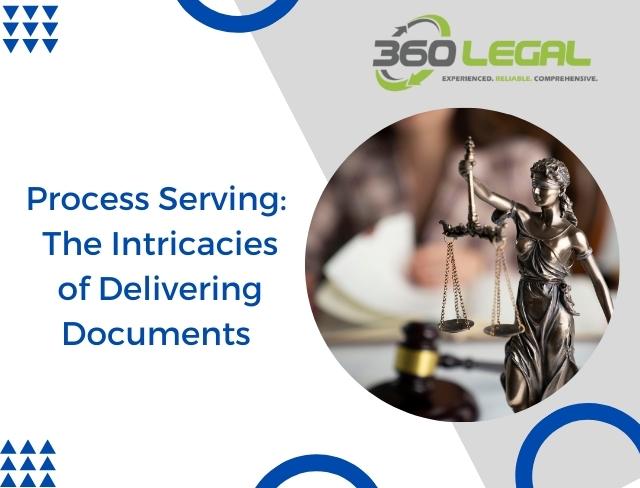The Important Role of Process Serving in Court and Legal Proceedings
Understanding the Importance of Refine Serving in Lawful Procedures
Refine serving is a basic facet of legal procedures that ensures all events are notified of their commitments and legal rights. By helping with the official shipment of crucial legal records, it supports the concepts of due procedure and adds to the stability of the judicial system. However, the nuances of reliable procedure serving prolong past mere delivery; they include lawful requirements and potential repercussions of inappropriate service. Understanding these ins and outs can substantially influence the outcomes of lawful disagreements, prompting a more detailed evaluation of the techniques that underpin this vital function.
Interpretation of Refine Offering
Refine serving is a critical part of the lawful system, specified as the official shipment of legal files to people associated with a lawsuit. This procedure makes sure that all events are appropriately notified of lawsuits being taken versus them or to which they are an event. Usually, these files consist of summons, complaints, subpoenas, and other court-related papers that call for the recipient's attention and response.
The significance of process serving lies in its function in promoting the concepts of due process. It ensures that individuals have notice of legal proceedings, thus providing them a chance to respond or defend themselves. Appropriate solution of process is not merely a procedural formality; it is a basic facet of making certain justness and openness in the judicial system.
Refine offering can be conducted by different people, including professional process-server, police police officers, and even attorneys, depending upon jurisdictional policies. Each method of service has its own criteria and methods, which are crucial to avoid hold-ups or terminations within the lawful framework. Recognizing the interpretation and function of procedure offering is essential for all stakeholders included in lawful proceedings.

Legal Requirements for Process Offering
Legal demands for procedure serving are vital to make certain that the delivery of lawful papers sticks to developed methods and is acknowledged by the court. Each territory has specific regulations regulating exactly how and when documents must be served, which might consist of subpoenas, summonses, and issues.
Generally, process-server need to be neutral 3rd parties that are not associated with the instance. They have to likewise abide with state guidelines relating to solution methods, which can include individual solution, substitute service, or solution by mail. Personal solution involves supplying files directly to the recipient, while replacement solution allows for shipment to one more responsible person at the recipient's house or location of organization.
Furthermore, process-server are typically required to file an evidence of solution, a legal paper that confirms the shipment of documents, with the court. This record includes information such as the day, time, and method of service, in addition to the name of the person served.

Role in the Justice System
A vital part of the justice system, process offering ensures that individuals associated with lawful process are correctly alerted of actions taken versus them (Process Serving). This official notification is crucial for maintaining the concepts of due process, which mandates that events have the chance to reply to cases made versus them. Without efficient process offering, the lawful system would be made inadequate, as individuals could participate in activities without recognition of pending lawful matters
Process web servers offer a crucial function in safeguarding the stability of the lawful procedure. They work as neutral events, supplying lawful records such as summons, complaints, and subpoenas, thus fostering transparency and liability within the judicial framework. By making sure that all events are notified, process serving helps to stop any potential unreasonable advantage, permitting equitable engagement in legal proceedings.
Moreover, the expertise of process web servers adds to the public's count on the justice system. Their adherence to honest methods and lawful requirements reinforces the authenticity of the judicial process. Inevitably, effective procedure offering is essential in advertising the policy of law and making sure that justice is obtainable to all individuals associated with lawful conflicts.
Consequences of Improper Solution
The consequences of inappropriate service can dramatically undermine the honesty of legal process. When an event is not served correctly, it can result in a host of problems, including hold-ups in the event timeline and boosted lawful costs. Inappropriate service can cause the defendant not being mindful of the lawsuit versus them, which may stop them from reacting properly or offering their protection. This lack of notice can eventually bring about skip judgments, where the court policies in favor of the plaintiff without hearing the defendant's side.
Additionally, inappropriate service can provide court orders and judgments invalid, requiring the plaintiff to restart the procedure, which can be both time-consuming and monetarily troublesome. It can likewise unlock to challenges visit our website and allures, as the accused might say that they were not properly notified of the proceedings, complicating the legal recommended you read landscape even more.
Best Practices for Effective Service

2nd, timing plays an essential function. Serving files immediately can prevent hold-ups in legal process and ensure that all events are informed in a timely way. Furthermore, employing a professional process-server can boost effectiveness, as they are trained to navigate potential difficulties and make sure compliance with neighborhood laws.
Third, maintaining exact records of the service process is imperative. Recording the day, time, and manner of service can give crucial evidence if disagreements emerge concerning whether solution was properly carried out.
Conclusion
In conclusion, process serving is a crucial part of lawful treatments, making certain that all celebrations are properly alerted and managed the chance to respond. Abiding by legal requirements and best practices not only upholds the concepts of due procedure yet likewise strengthens the stability of the justice system. The repercussions of improper More hints service can lead to substantial hold-ups and issues, highlighting the requirement for efficient process offering in advertising fairness and access in lawful disagreements.
The subtleties of efficient process offering prolong beyond mere distribution; they include legal requirements and possible repercussions of improper solution.Process serving is a crucial part of the legal system, defined as the official shipment of lawful papers to individuals entailed in a court situation. Without effective procedure serving, the lawful system would be rendered inefficient, as individuals can engage in activities without understanding of pending lawful issues.
Refine servers offer a crucial role in guarding the stability of the lawful procedure - Process Serving. The consequences of inappropriate solution can lead to significant hold-ups and problems, highlighting the need for efficient procedure offering in advertising justness and availability in legal conflicts